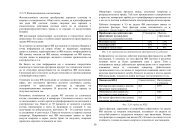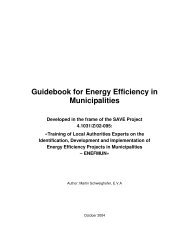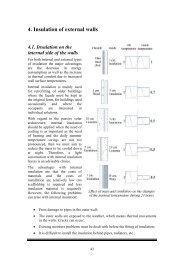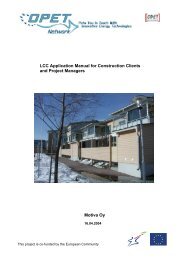Solar Energy Use in Bulgaria
Solar Energy Use in Bulgaria
Solar Energy Use in Bulgaria
You also want an ePaper? Increase the reach of your titles
YUMPU automatically turns print PDFs into web optimized ePapers that Google loves.
1. Institutional barriers:<br />
- Lack of a national programme for the development of renewable energy<br />
sources and the related technologies.<br />
- The various state <strong>in</strong>stitutions, although hav<strong>in</strong>g a positive attitude towards<br />
renewables, still do not pay the necessary attention to these energy<br />
sources.<br />
- Lack of regional and municipal structures, deal<strong>in</strong>g with energy plann<strong>in</strong>g<br />
and utilization of RES.<br />
- Lack of related codes and standards cover<strong>in</strong>g the technical requirements<br />
of the equipment and <strong>in</strong>stallations.<br />
- There are no authorised laboratories for quality control of the produced<br />
equipment.<br />
2. F<strong>in</strong>ancial barriers:<br />
- There are no state funds <strong>in</strong> <strong>Bulgaria</strong> for the development of RES utilisation<br />
and technologies. Such a fund would support to a greater extend the<br />
implementation of various RES projects, <strong>in</strong>clud<strong>in</strong>g solar thermal<br />
<strong>in</strong>stallations.<br />
- The <strong>Bulgaria</strong>n commercial banks have very prudent credit<strong>in</strong>g policy – high<br />
<strong>in</strong>terest rate (usually over 15 %) and credit guarantee more than 125 %.<br />
They absta<strong>in</strong> from grant<strong>in</strong>g long-term credits. Currently this burdens the<br />
small and medium size enterprises <strong>in</strong> produc<strong>in</strong>g solar collectors and solar<br />
thermal <strong>in</strong>stallations.<br />
- In some cases the renewable energy is still more expensive than the<br />
consumer price of heat and electricity. The pay-back period for solar<br />
thermal <strong>in</strong>stallations is more than 10 years.<br />
3. Legal framework<br />
The new <strong>Energy</strong> and <strong>Energy</strong> Efficiency Law (1999) treats only generally<br />
RES. Renewables are still not considered a priority <strong>in</strong> legislation and there<br />
are no <strong>in</strong>centives for their utilisation, <strong>in</strong>clud<strong>in</strong>g solar thermal <strong>in</strong>stallations as<br />
well.<br />
Opportunities assist<strong>in</strong>g RES (<strong>in</strong>clud<strong>in</strong>g solar energy)<br />
• The prices of conventional energy have <strong>in</strong>creased many times.<br />
Nevertheless, the energy market is still not liberalized. Under the<br />
<strong>in</strong>ternational pressure for liberalization of the energy sector, the energy<br />
prices soon will be <strong>in</strong> l<strong>in</strong>e with the <strong>in</strong>ternational levels and RES will be<br />
more competitive.<br />
• Environmental awareness is grow<strong>in</strong>g and RES are seen as a clean future<br />
source of energy<br />
• Decentralisation of the state regulation and the larger autonomy of the<br />
local and regional authorities leads to development of their natural<br />
resources as they see triple dividends: environmental improvement,<br />
economic development and <strong>in</strong>creased employment.<br />
6






